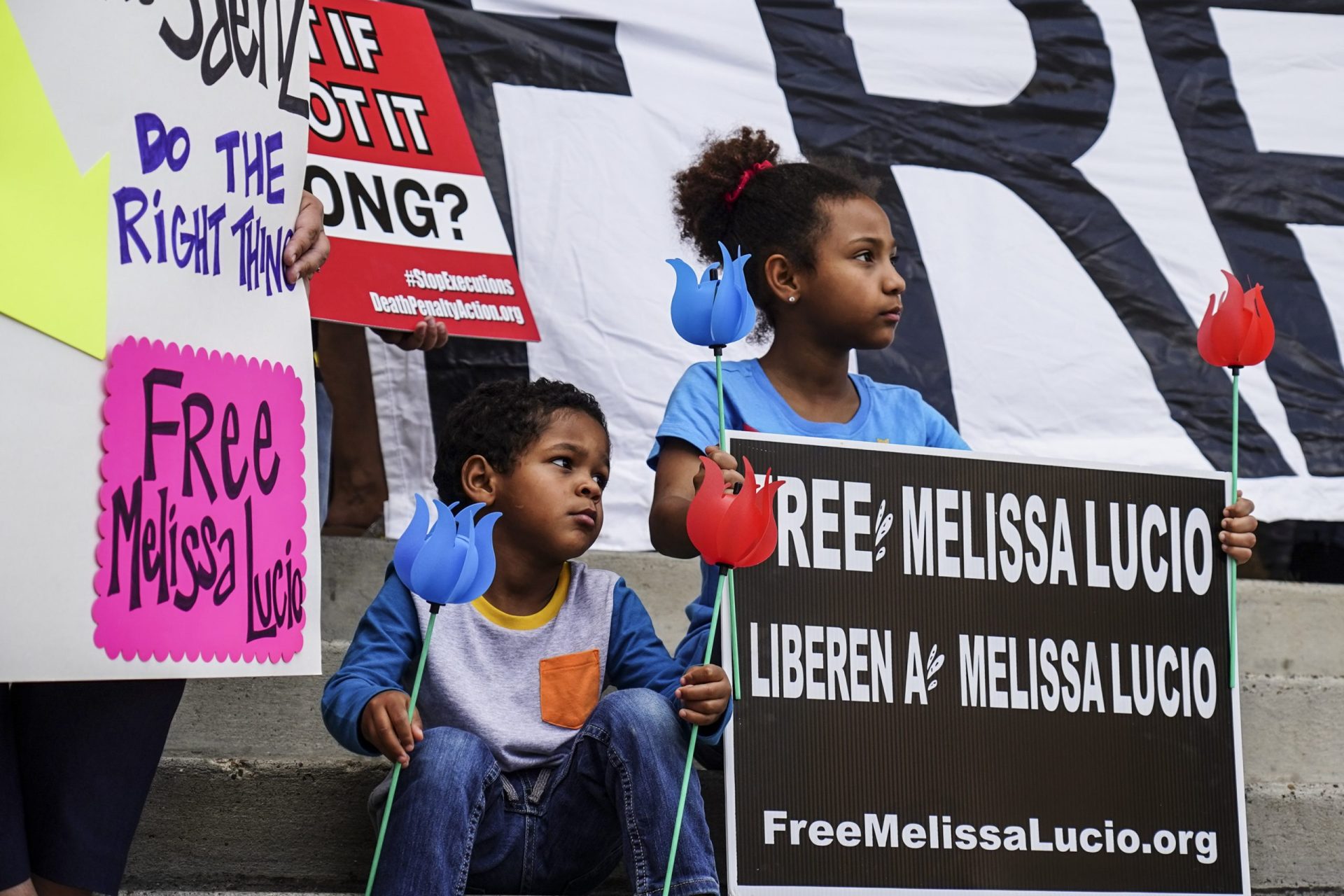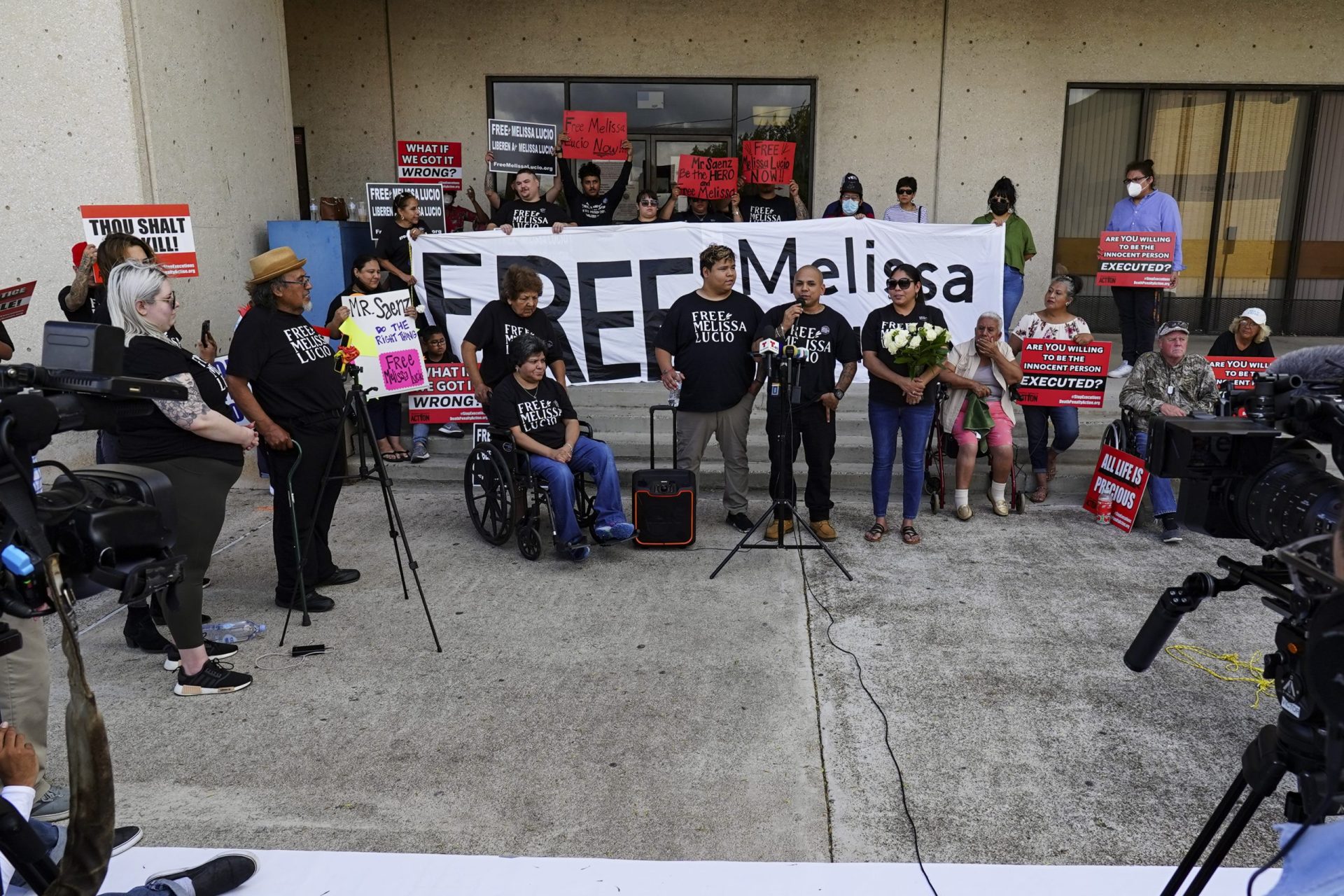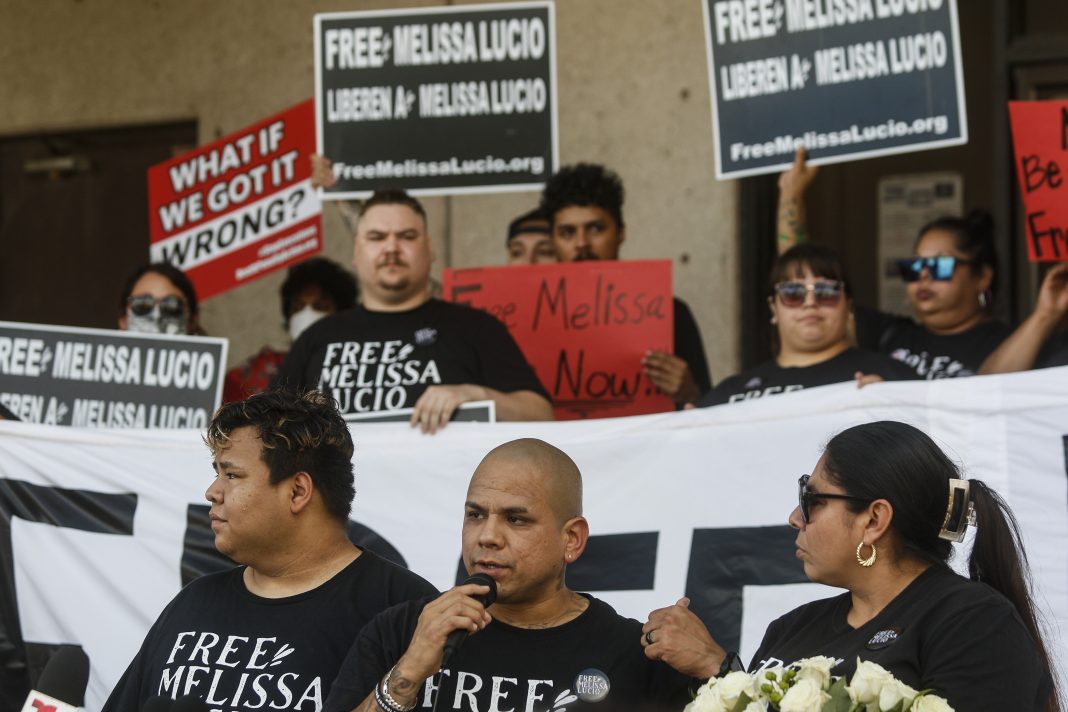A lot can change in 48 hours.
For months, Wednesday was set to be the day in Huntsville when Texas executed the state’s first Hispanic woman on death row. Yet, following a stay of execution Monday from the Texas Court of Criminal Appeals, Melissa Lucio’s plight returned to Brownsville as her supporters converged instead outside the Cameron County Courthouse.
They gathered to demand that District Attorney Luis V. Saenz drop the charges against her.
Free Melissa Lucio activists and organizers traveled from throughout Texas and beyond to attend a “Rally in the Valley” event at the courthouse in Brownsville where Saenz, the Cameron County district attorney, has his offices.
A “White Flower Vigil” at nearby Washington Park followed at 6 p.m., the time Lucio’s execution had been scheduled, with prayer and in hope that she will soon be freed.
When the clock turned to 6 p.m., supporters, anti-death penalty activists and family members threw white carnations they brought for the occasion into the fountain at Washington Park.
“My mother is innocent,” said John Lucio, Melissa Lucio’s oldest son. “She should not have to spend another night in prison. I am asking everyone who cares about justice to help us get as many people as possible to Brownsville to ask Mr. Saenz to be the hero here. He has the power to drop the charges and free Melissa Lucio now.”

Activists spoke about the resources they said are being wasted to incarcerate Melissa Lucio and the possibility that Cameron County taxpayers will be forced to spend more than $1 million for a new capital trial for Lucio.
“I saw at least 10 news organizations here. We’re telling the world and especially Cameron County voters to not waste this money and put her through another trial,” Abraham Bonowitz, Cameron County coordinator for the #FreeMelissaLucio campaign since Lucio’s execution date was set in January. “Our goal is to have Luis Saenz release her, just drop the charges. I think a lot of people will breathe a sigh of relief that we’re not going to waste a lot of money to try to convict an innocent person. Everybody that’s seen that film knows, they’ve seen the evidence. She’s innocent.”
Lucio, 53, has been in prison since 2008, convicted by a Cameron County jury of one count of capital murder in the 2007 death of her 2 1/2-year-old daughter, Mariah Alvarez. Lucio has maintained her innocence during the trial and subsequent appeals process and denies killing the toddler, who had bruises and injuries—even what were identified as bite marks on her back—at the time of her death, according to authorities and court testimony.
On Wednesday, Saenz’s office told The Brownsville Herald he planned no additional statements about the case.
“One of her arms had been broken probably about two to seven weeks before her death,” states the district attorney’s April 21 response to Lucio’s appeals to the Texas Court of Criminal Appeals, “and she was missing portions of her hair where it had been pulled out by the roots.”
The response continues: “The emergency room physician… testified that this was the ‘absolute worst’ case of child abuse that he had seen in his 30 years of practice.”
Those interpretations are at the center of the appeals battle. Lucio and her defense attorneys argue that the child died from injuries sustained from falling down stairs at the family’s Harlingen apartment.
Her lawyers also contend unscientific and false evidence misled jurors into believing Mariah’s injuries could have been caused only by abuse and not by medical complications from a severe fall down a steep staircase. Lucio’s attorneys say her capital murder conviction was based on an unreliable and coerced confession and she wasn’t allowed to present evidence questioning the validity of her confession.

The Court of Criminal Appeals ruled to halt the execution so that a lower court could review four claims from the defendant’s nine assertions:
>>”But for the State’s use of false testimony, no juror would have convicted her;”
>>”previously unavailable scientific evidence would preclude her conviction;”
>>”she is actually innocent;”
>>and “the State suppressed favorable material evidence in violation of Brady v. Maryland”.
The court ruled Monday: “We therefore remand those claims to the trial court for a merits’ review.”
Lucio’s execution is stayed until the lower court resolves the claims remanded for review. As of Wednesday, it appeared that a date for that review had not yet been set.
In recent weeks, Saenz has declined all requests for media interviews related to the case.
The upcoming review could lead to a new trial for the Harlingen mother as courts have yet to consider evidence cited in the defense motion that led to the stay of execution. In such an instance, Saenz is unlikely to end the county’s prosecution of the case—and even appeared to push back Monday against the Free Melissa Lucio campaign, which has been rallying support through social media, petitions, protests, and appeals to “watch the film,” a reference to the 2020 documentary “The State of Texas vs. Melissa” by filmmaker Sabrina Van Tassel.
She spoke at the rally, saying she was proud to see the effect the film has had on those who see it.
“I think it has been a success, I mean it has been picked up and seen all over the world,” she said. “It started the movement. I know that the Texas state legislators learned about the case through the film. It’s the greatest gift as a journalist to actually uncover a story and give it to the world and change someone’s life … so I’m just really happy that my film helped build a movement. It became national and international.”
Activists wore Free Melissa Lucio T-shirts at the rally that urged people to “Watch the Film.”
On Monday, the district attorney released a statement that read: “As I stated before, I welcome the opportunity to prosecute this case in the courtroom: where witnesses testify under oath, where witnesses may be cross-examined, where evidence is governed by the rules of evidence and criminal procedure, and where the court rules pursuant to the rule of law. That is our criminal jurisprudence system, and it is working.”
If ultimately put to death, Lucio would be the first Latina executed by Texas and the first woman the state has put to death since 2014.
What awaits is expected to be a tough courtroom battle for both sides, and even if the defense team manages to get the trial judge on their side, the state’s top criminal court — which has the final say — might disagree and keep her conviction in place, legal experts said Tuesday.
“Winning a favorable recommendation is not a done deal. …There is still a long way to go before this case is resolved,” said Robert Dunham, executive director of the Death Penalty Information Center.
To see more, view Brownsville Herald photojournalist Denise Cathey’s full photo gallery here:
Photo Gallery: Following stay of execution, Melissa Lucio advocates press for her release




